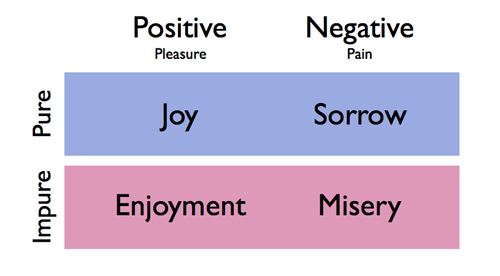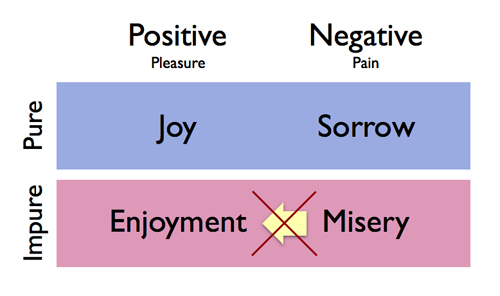 I would like to address the subjects of sorrow, misery, joy, happiness, peace, and love, and present a fresh perspective on how each of these terms relate to each other. I think it may be possible that we often misunderstand the relationship between these terms. However, please note that I use these terms differently and little more narrowly than they might be used in other contexts, including the scriptures themselves. In other words, the scriptures might not always make a clear distinction between sorrow and misery, joy, enjoyment, which I will attempt to do here.
I would like to address the subjects of sorrow, misery, joy, happiness, peace, and love, and present a fresh perspective on how each of these terms relate to each other. I think it may be possible that we often misunderstand the relationship between these terms. However, please note that I use these terms differently and little more narrowly than they might be used in other contexts, including the scriptures themselves. In other words, the scriptures might not always make a clear distinction between sorrow and misery, joy, enjoyment, which I will attempt to do here.
Pleasure and Pain Morally Neutral
First, I believe that pleasure and pain are morally neutral. Neither are inherently good or bad—they are simply experiences that we have of the world, like the color purple or the sound of a bell. A purple ribbon, for example, has been used to convey support for victims of child abuse, but there is no inherent meaning in the color purple itself. If the color purple communicates to us, it is because we’ve applied meaning to it. Likewise, the sound of a bell has not inherent meaning. It could mean the end of a school day, or lunch time, or even that an angel has earned its wings, but only because we’ve applied meaning to the sound.
I think the same is true of pleasure and pain. We can give different meaning to these experiences, but without our meaning-making, they are inherently neutral in terms of their moral temperament. In other words, I don’t think pain is inherently bad or that pleasure is inherently good (in a moral sense), and so I don’t believe that pain is always the product of sin or transgression (either on our own part, or on the part of Adam and Eve). The moral quality of pain and pleasure are determined by the experiencer—one can experience both with either a pure heart or an impure heart.
Qualitative Differences in Our Experiences
Now I am going to abstract the idea of pain and pleasure a little bit more, and refer to negative (uncomfortable) experiences, and positive (comfortable) experiences instead. This includes not just physical pleasure and pain, but emotional pleasure and pain as well.
I think that negative experiences, when experienced with an impure heart, can be referred to as misery. However, when they are experienced with a pure heart, they can be referred to as sorrow. Both are equally negative experiences, but there is a qualitative difference in how we experience them. I think this qualitative difference rests in the meaning these experiences have for us. In other words, there are two types of suffering—one is a kind of sorrow, while the other is a kind of misery.
Consider further—while righteous suffering might include physical pain or personal emotional heartache, it also includes sorrow and suffering on the behalf of others. Think about Christ, when he wept because of the death of Lazarus. ((John 11:33-36)) God weeps because of the suffering and sins of those He loves. Think of the sorrow a mother feels for a lost child—that kind of sorrow is certainly a Godly sorrow, born of love, compassion, heartache, and bereavement. None of these are the same as misery.
Likewise, positive experiences, when experienced with an impure heart, can be referred to as enjoyment. However, when they are experienced with a pure heart, they can be referred to as joy. Again, both might be equally positive experiences, but there is a qualitative difference in how we experience them. Again, I think this qualitative difference rests in the meaning these experiences have for us. Consider the words of Christ, who said that those who sin may actually enjoy their sins, for a time. He said those who don’t center their lives in His gospel “have joy in their works for a season” ((3 Nephi 27:11)), but those who live that Gospel shall find eternal peace and joy. I believe that difference is not just in the duration of the positive experience, but also in the moral quality of it as well. The joy of one who has a peace of conscience is qualitatively different than the enjoyment of one who finds pleasure in sin. I think a chart might help clarify:
I believe the chart is pretty self-explanatory. Simply put, good people can experience sorrow and suffering, but they don’t experience misery. Their negative experiences have a qualitatively different tone to it than those with impure hearts. Similarly, those who are impure can experience enjoyment, but they don’t experience joy. Their positive experiences have a qualitatively different tone to them than those who have pure hearts.
The Yellow Brick Road Syndrome
As mentioned before, the Yellow Brick Road Syndrome is the assumption that turning to Christ and living the Gospel will lead us to a life free of sorrow and pain. Using our chart, we assume that living the gospel of Jesus Christ will take us out of the right hand column, and into the left hand column, as illustrated below:
Whether we think we’ll end up in the “enjoyment” category or the “joy” category, we assume that the Gospel of Jesus Christ turns negative experiences into positive experiences. We assume that righteousness leads only to positive experiences, and sin leads only to negative experiences—which, as I explained in the first article of this series, is a subtle variant of the philosophy of hedonism.
Gospel Living Is Not a Yellow Brick Road
A brief survey of the scriptures will quickly demonstrate that Gospel living is not a Yellow Brick Road. For example, think of the early Christians, who were persecuted for their faith. Think of the pioneers, who gave up their homes, families, and belongings to cross the plains—only to lose even more family members (and sometimes their very lives) in the journey. Think of Abinadi, who was murdered for teaching about Christ. ((Mosiah 17:20)) Think of Amulek, who, after converting to Christ, watched some of his former friends murder his convert friends and family because of their faith. ((Alma 14:8-11))
Think of the Savior Jesus Christ Himself, who lived a sinless, perfect life, and yet suffered “temptations, and pain of body, hunger, thirst, and fatigue, even more than man can suffer, except it be unto death; for behold, blood [came] from every pore, so great [is] his anguish for the wickedness and the abominations of his people.” ((Mosiah 3:7)) Modern-day revelation tells us that God Himself weeps with sorrow and anguish over His children. Enoch reports that he saw the “God of heaven [look] upon the residue of the people, and he wept.” ((Moses 7:28)) The idea that righteousness inoculates us against pain is not only of non-Christian origin (e.g., the philosophy of hedonism), it defies some of the basic tenets of the Christian faith. Elder Jeffrey R. Holland has insightfully observed:
I am convinced that [gospel living] is not easy because salvation is not a cheap experience. Salvation never was easy. We are The Church of Jesus Christ, this is the truth, and He is our Great Eternal Head. How could we believe that it would be easy for us when it was never, ever easy for Him? It seems to me that [each of us] have to spend at least a few moments in Gethsemane. [Each of us] have to take at least a step or two toward the summit of Calvary.
Now, please don’t misunderstand. I’m not talking about anything near what Christ experienced. That would be presumptuous and sacrilegious. But I believe that [each of us], to come to the truth, to come to salvation, to know something of this price that has been paid, will have to pay a token of that same price. …
If He could come forward in the night, kneel down, fall on His face, bleed from every pore, and cry, “Abba, Father (Papa), if this cup can pass, let it pass,” then little wonder that salvation is nto a whimsical or easy thing for us. If you wonder if there isn’t an easier way, you should remember you are not the first one to ask that. Someone a lot great and a lot grander asked a long time ago if there wasn’t an easier way. ((Jeffrey R. Holland, “Missionary Work and the Atonement.” Elder Holland was talking specifically about missionaries, but I felt it was safe to generalize his remarks to each of us in every aspect of our lives.))
In short, life isn’t all about positive experiences. We will have negative experiences, whether we are following Christ or not. In fact, we can all but guarantee that suffering and sorrow is one of the prices of true discipleship. Paul stated that Moses chose “rather to suffer affliction with the people of God, than to enjoy the pleasures of sin for a season.” ((Hebrews 11:25)) When we follow Christ, we will also follow His footsteps into suffering and heartache.
If Christ doesn’t take away our sorrows, what does He do for us? In the next article of this series, I will explore the relationship between Christ and sorrow—and hopefully show that although Christ doesn’t take away our sorrows, he can transform the way we experience them.


